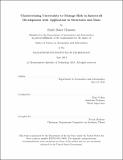Characterizing uncertainty to manage risk in spacecraft development with application to structures and mass
Author(s)
Clements, Emily Baker
DownloadFull printable version (7.583Mb)
Other Contributors
Massachusetts Institute of Technology. Department of Aeronautics and Astronautics.
Advisor
Kerri Cahoy.
Terms of use
Metadata
Show full item recordAbstract
Most space programs experience significant cost and schedule growth over the course of program development. Poor uncertainty management has been identified as one of the leading causes of program cost and schedule overruns. Traditional methods of uncertainty management are deterministic, using industry standards to predict worst-case inputs and designing systems accordingly. However, this method can lead to inefficient use of resources due to excessive need for redesign of subsystems when other subsystems evolve. Improvements in computational power now allow more sophisticated uncertainty analysis methods using probabilistic techniques. We propose a spacecraft design methodology that uses Monte Carlo and Gradient-based Sensitivity Analysis of system models to reduce program cost and schedule overruns by identifying design issues early when redesign is less expensive. We cover applications to mass budgets and finite element analysis to illustrate this methodology. The META complexity metric is a measure of uncertainty of a quantity of interest based on exponential entropy from information theory. The Trapped Energetic Radiation Satellite (TERSat) structural design process is used as a test case to evaluate the methodology, with a focus on the mass budget and finite element analysis. While traditionally mass budget uncertainty is treated with margins and contingencies, we present a way to model the mass of a system and its components as probability distributions using studies of historical data to model the means and standard deviations. We propagate the uncertainties in the mass budget analysis through the TERSat finite element model to determine the effects of the uncertainty on structural analysis outputs. We show that uncertainty analysis and sensitivity analysis can help to identify design issues early and guide the redesign and refine processes for spacecraft development.
Description
Thesis: S.M., Massachusetts Institute of Technology, Department of Aeronautics and Astronautics, 2013. This electronic version was submitted by the student author. The certified thesis is available in the Institute Archives and Special Collections. Cataloged from student-submitted PDF version of thesis. Includes bibliographical references (pages 101-104).
Date issued
2013Department
Massachusetts Institute of Technology. Department of Aeronautics and AstronauticsPublisher
Massachusetts Institute of Technology
Keywords
Aeronautics and Astronautics.